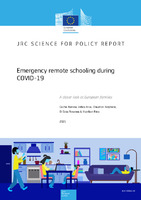| dc.contributor.author | European Commission |
| dc.contributor.author | Cachia, Romina |
| dc.contributor.author | Velicu, Anca |
| dc.contributor.author | Chaudron, Stephane |
| dc.contributor.author | Di Gioia, Rosanna |
| dc.contributor.author | Vuorikari, Riina |
| dc.date.accessioned | 2021-11-23T11:41:32Z |
| dc.date.available | 2021-11-23T11:41:32Z |
| dc.date.issued | 2021 |
| dc.identifier.issn | 1831-9424 |
| dc.identifier.uri | https://ketlib.lib.unipi.gr/xmlui/handle/ket/3765 |
| dc.description | This publication is a Science for Policy report by the Joint Research Centre (JRC), the European Commission’s science and knowledge - service. It aims to provide evidence-based scientific support to the European policymaking process. The scientific output expressed does not imply a policy position of the European Commission. Neither the European Commission nor any person acting on behalf of the Commission is responsible for the use that might be made of this publication. For information on the methodology and quality underlying the data used in this publication for which the source is neither Eurostat nor other Commission services, users should contact the referenced source. The designations employed and the presentation of material on the maps do not imply the expression of any opinion whatsoever on the part of the European Union concerning the legal status of any country, territory, city or area or of its authorities, or concerning the delimitation of its frontiers or boundarie |
| dc.description | EU Science Hub https://ec.europa.eu/jrc |
| dc.description | doi:10.2760/613798 |
| dc.description.abstract | This report maps the digital engagement of children aged between 6 and 12 years and
the perceptions and practices of their parents, related to emergency remote
schooling during and after the spring 2020 lockdown during the COVID-19 pandemic.
It relies on the rich accounts of 105 children and their parents interviewed by researchers
across ten countries between April and December 2020.
The aim of this report is to:
get a better understanding of remote schooling in European households
during the COVID-19, so that policymakers and education stakeholders may be
informed of the current trends and possible impacts of the COVID-19 crisis on
schooling and future models of online/ blended learning/ hybrid education
provide recommendations to ensure that future policy actions are aligned with
the needs reported by European families, that future risks are mitigated and positive
developments are further supported |
| dc.format.extent | 80p. |
| dc.language.iso | en |
| dc.publisher | Publications Office of the European Union |
| dc.subject | COVID-19 pandemic |
| dc.subject | European families |
| dc.subject | Transversal skills |
| dc.title | Emergency remote schooling during COVID-19, a closer look at European families |
| dc.type | com document |
| dc.publisher.place | Luxembourg |

